Stats and facts
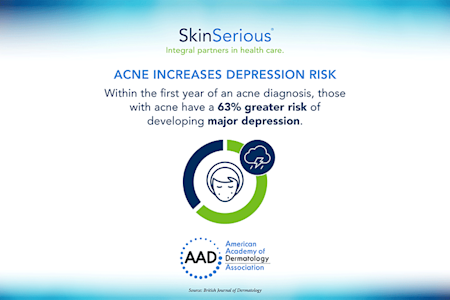
People with acne face a significantly increased risk of depression compared to those without acne.

Alopecia areata patients are more likely than other individuals to have mental health conditions, including anxiety and mood disorders.

Atopic dermatitis, the most common chronic inflammatory skin disease, is highly prevalent in patients with Black or Brown skin. African American children have an increased risk of atopic dermatitis compared to European American children.

Research indicates that pruritus, or itch, is associated with a number of malignancies, including cancers of the liver, blood, and skin.

Dermatologists perform lifesaving, cost-effective in-office surgeries, saving patients and the health care system time and money.

More health care workers are reporting occupationally induced skin conditions related to the use of personal protective equipment during the COVID-19 pandemic, including contact dermatitis and pressure-related skin injuries.

Eczema affects more than your skin. Adults with eczema are at a higher risk of developing ocular diseases.

Ichthyosis is a genetic skin disorder characterized by dry, thickened, scaly skin. Many patients experience psychiatric distress and impaired quality of life.

Psoriasis is not just a skin disease. There is an association between psoriasis, diabetes, and excess weight, perhaps due to a common genetic cause.

Research indicates that patients with rosacea have an increased risk of developing psychiatric disorders, especially phobic disorder and obsessive-compulsive disorder.

Adults who have had shingles may be at a higher risk for heart problems.

Sleep apnea—interruptions in breathing while sleeping—doesn’t just leave patients tired. It can also diminish their immune system health, especially among patients with melanoma.

In addition to having a negative impact on patients’ quality of life, alopecia areata (AA) can impact the whole family.

Patients with atopic dermatitis, especially those who smoke, are at higher risk for having multiple autoimmune diseases.

Research indicates that atopic dermatitis is associated with an increased risk of developing several types of infections.

Kids with psoriasis are at a higher risk for obesity, hypertension, and diabetes.
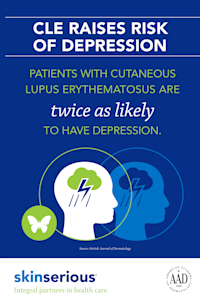
The risk of depression is significantly increased in patients with cutaneous lupus erythematosus.

Dermatology consults are an integral component of hospital care for patients with inflammatory skin conditions.

Research suggests that regular visits with a dermatologist result in detection of nodular melanoma at an earlier, more survivable stage.

For millions of Americans with eczema, horrible itching is just the beginning. They are at heightened risk for several other medical conditions, and also face reduced quality of life.

Patients with hidradenitis suppurativa are at a higher risk for chronic pulmonary disease, diabetes, and mild liver disease.

Hidradenitis suppurativa, an inflammatory disease that causes bumps to appear on the skin, is associated with comorbidities in young people.
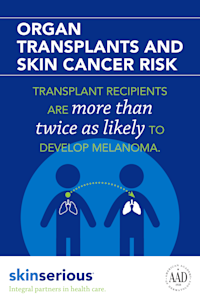
Due to long-term complications from immunosuppressive therapy, transplant patients face a much greater risk for melanoma, the deadliest form of skin cancer, than the general population.
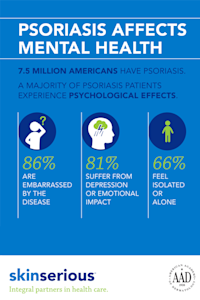
Patients with psoriasis report that they are both physically and mentally affected by the disease. Many say the disease bears a “heavy emotional toll” and report feeling isolated or shunned due to their condition.

People with psoriasis or psoriatic arthritis are at a significantly higher risk of suffering bone fractures.

In patients with hypertension, psoriasis is tied to increased risk of additional cardiovascular conditions and medical intervention
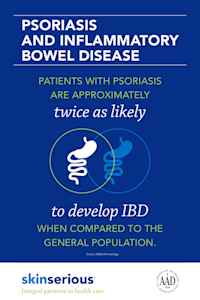
Psoriasis is associated with Crohn disease and ulcerative colitis — broadly known as inflammatory bowel disease.

3 in 4 patients with psoriatic arthritis have coronary plaques, which can lead to heart disease.

Research indicates that people with psoriasis and psoriatic arthritis have an increased risk of developing thyroid disease.

Two-thirds of patients with pyoderma gangrenosum, a skin disease that causes large, painful sores, also have other medical conditions.

Dermatologists and other physicians treating rosacea patients 60 and older who exhibit signs of cognitive changes should refer them for appropriate neurological screening and diagnosis.

Severe psoriasis can significantly increase risk of death.
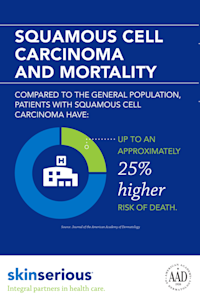
Patients with squamous cell carcinoma are at have a higher risk for of death from any cause compared with the general population.

A recent study suggests an association between vitiligo and major depressive disorder, with each condition increasing the risk of the other.

People with vitiligo have an increased risk for autoimmune thyroid diseases and thyroid cancer.
 Find a Dermatologist
Find a Dermatologist
 Member directory
Member directory
 AAD Learning Center
AAD Learning Center
 2026 AAD Annual Meeting
2026 AAD Annual Meeting
 Need coding help?
Need coding help?
 Reduce burdens
Reduce burdens
 Clinical guidelines
Clinical guidelines
 Why use AAD measures?
Why use AAD measures?
 Latest news
Latest news
 New insights
New insights
 Physician wellness
Physician wellness
 Joining or selling a practice?
Joining or selling a practice?
 Promote the specialty
Promote the specialty
 Advocacy priorities
Advocacy priorities
